Brendan I. Koerner's Blog, page 3
June 24, 2021
The Void of Expertise

One reason I generally shy away from celebrity biographies is that they typically involve too much authorial sleight-of-hand. Though they’re written in the first-person, it’s always obvious that the actor or athlete or entrepreneur behind the “I” didn’t actually commit any words to paper. Even the savviest ghostwriter can’t help but leave their fingerprints all over the text, and that strikes me as semi-unseemly when the main character refuses to give much credit to their hired wordsmith. (The rare exception here is Andre Agassi’s Open, in which the subject is very upfront about why he hired J.R. Moehringer to write his life’s story, and how he trusted the ghostwriter’s vision.)
The flip side of my aversion to ghostwritten celebrity bios is my affinity for such memoirs that are clearly self-authored. The archetype I have in mind here is Mr. T’s splendid The Man with the Gold, my copy of which I recently unearthed while unpacking from a move. In addition to spawning one of the best publicity photos in human history, the book reveals its author—who makes clear that no ghostwriter was involved on the very first page—to be someone who used the writing process as a messy form of therapy. There are misspellings throughout, plot holes, contradictions, and poor grammar—all evidence that the former Lawrence Tureaud was true to his word about seeking little outside help. (I assume there was an editor at St. Martin’s Press, but he or she was probably mostly interested in rushing the project to press while The A-Team was still hot.) The Man with the Gold may be a country mile from the realm of literature, but it conveys a sense of genuine vulnerability and introspection that’s lacking from most celebrity autobiographies that now overwhelm the front tables at Barnes & Noble.
Re-discovering The Man with the Gold inspired me to seek out other examples of the self-written celebrity memoir genre, which is how I stumbled across the diamond in the rough entitled Life as I Know It Has Been “Finger Lickin’ Good”, by KFC founder Harland Sanders. (I feel a little weird referring to him as Colonel Sanders; after all, we don’t talk about “Colonel Darryl Strawberry” or “Colonel Hunter S. Thompson.”)
Sanders’ writing style is quite different from Mr. T: It’s more laid-back, less staccato and sermon-like. That’s not always a plus, as there are pages that slip by without making an impression—I do get the sense that Sanders probably dictated a lot of the book into a tape recorder, possibly while taking a warm bath. But the memoir still vibrates with an appealing sense of honesty, a lack of concern with how the more outré parts of the subject’s life might be perceived. The passage that will forever stick with me most is this harrowing one, in which Sanders nonchalantly recounts how, without a shred of formal training, he started delivering babies in an impoverished corner of southeastern Kentucky.
About that time I also got involved with obstetrical work, delivering babies. There was nobody else to do it. The husbands couldn’t afford a doctor when their wives were pregnant. They had no money at all. No nothing. Like I say, some of those homes didn’t have enough money for their next meal.
We had one family by the name of Humphrey. They lived back in the woods, way beyond the end of the road. The lady was due to deliver. I’d been told when she was expecting so I kept a close watch. When I didn’t get any call I went to her and did an examination and determined that the baby was dead. That was the reason it hadn’t been born.
I asked some men to get some bed clothing and lay it on poles lengthwise leaving the poles about two feet longer at each end than the bedspread. That made a stretcher. We put her on this bedspread, then four men took hold of the poles and we carried her about two miles out of the woods to where the ambulance could get her. They took her to the London hospital where they found that sure enough, the baby had died. The doctor said in another couple of hours, peritonitis would have set in and she would have died, too. I don’t know how they delivered the baby. I had no hand in that, but the mother came back a well woman.
Sanders’ career as an amateur midwife didn’t last long: He got out of game several months later, after he helped save a baby whom the mother then named “Harland” in his honor.
If you know of other self-written celebrity memoirs, please advise in comments; I’m thinking of devouring as many as I can over the summer to come. Bonus points if the book in question starts with the author emphatically stating that he or she would never dream of hiring a ghostwriter.
The post The Void of Expertise first appeared on Microkhan by Brendan I. Koerner.June 11, 2021
What Burns Sometimes Returns

I’m not entirely sure why I chose today to re-open this blog after five-plus years of silence. Lord knows there have been many times when I’ve toyed with the idea of popping back up on these august pages, but I could never quite work up the gumption to do so. This morning, though, I realized I’d probably have a spare hour or two between my last interview and picking up Kid Two from school. And what better way to pass the time than by re-connecting with you, dear Microkhan readers, whose ranks can surely be counted on one hand at this point in the time.
So, you might ask, what have I been up to since I last published some of my undercooked thoughts in this blessed space? Well, let’s begin with my most recent doings, and then work our way backwards. And once we get through the boilerplate, I’ll let you know what to expect in the weeks and months to come. (Spoiler: Mostly me using Microkhan as a public scratch paper, a way to work through the zillion ideas bouncing around my head in the hopes of stumbling into my next batch of major projects.)
First off, I’d like to direct you to a story that I started working on back in 2012, but which only saw the light of day this spring. It’s the tale of a bizarre kidnapping and its decades-long aftermath, and it might just be the endeavor I grew to care most about since I abandoned this blog. Even though it’s now out in the world and I’m supposed to move on, it still occupies a huge chunk of my thoughts every day. I’m haunted by what it taught me about the incoherence of evil.
While working on that Atlantic story at a turtle’s pace, I also churned out several Wired pieces that I consider pretty darn solid. (I churned out some forgettable dreck, too, but let’s never speak of my failures again.) My primary beat over there has become malfeasance that occurs on the edges of the digital realm, which is how I ended up writing about the rise and fall of the Xbox Underground; the first swatting to ever result in a death; the mysterious disappearance of a troubled Ohio programmer; and a mammoth cheating scandal in the world of mid-stakes poker. Most recently, I veered away from the sinister by profiling the man who transformed how bowling balls are made—though that story is by no means free of tragic twists.
Per the usual, I have a bunch of projects cooking at the moment: a Wired story that has sunk its hooks into my heart, a TV series that is ever-so-slowly coming to fruition, a screenplay gig that’s allowed me to learn a ton about the art of perseverance. But I’ve also had to endure a bevy of disappointments, which is the frustrating norm in this line of work. Suffice to say that I’m no stranger to the experience of taking a joyous step forward, only to get thwacked back two paces by the hand of circumstance. Books have fallen through, adaptations have disintegrated, stories that I love have withered on the vine. And yet perhaps unwisely, I keep peeling myself off the canvas.
My chief reason for being here now is to scribble my way toward new horizons. I’ve found that it’s difficult for me to think through problems unless I’m tossing words onto the page. For the past five years, those pages have been in the many steno notebooks I keep lying around my office. But that approach hasn’t yielded much in the way of positive results, so I thought What the heck? Why not do this rumination in semi-public?
Yeah, sure, the smart move would’ve been to come to this realization two years ago and then launched an early Substack. But I clearly missed the boat on that, and I’m not sure the unwritten conventions of Twitter (which I still adore to some degree) jibe with what I need at the moment. And so here I am, back to occasional Microkhan-ing for the entertainment and edification of the masses.
More from me at some point in the not-too-distant future. Take care of yourselves, treasured comrades. And if anyone knows of a good, non-lethal way to get rid of a portly groundhog, please advise—I’m currently having problems with such a creature, and he/she is proving far craftier than I’d anticipated.
The post What Burns Sometimes Returns first appeared on Microkhan by Brendan I. Koerner.January 8, 2016
For the Love of Duke, Cont’d
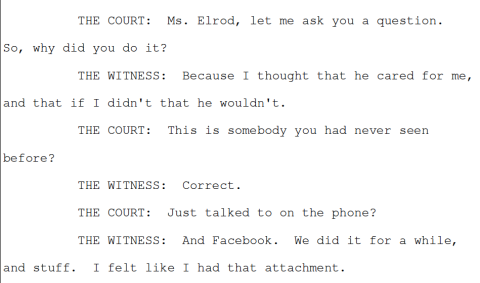 Last October, Wired was kind enough to publish a story I’d been working on for 16 months—the tale of a lonely Appalachian woman acted as a money mule for a crew of Nigerian con artists. That woman, Audrey Elaine Elrod, was lured into the conspiracy by a scammer who posed as a Scottish oil worker on Facebook. Elrod fell head-over-heels in love with this fictional character, who dubbed himself “Duke McGregor.” The crook who played McGregor bilked Elrod out of her paltry life savings, then flipped her into an accomplice who relayed other victims’ funds to Warri, Nigeria. Inevitably, the Feds caught wind of Elrod’s shady financial dealings and prosecuted her for structuring, which is why I had to meet her in a West Virginia prison.
Last October, Wired was kind enough to publish a story I’d been working on for 16 months—the tale of a lonely Appalachian woman acted as a money mule for a crew of Nigerian con artists. That woman, Audrey Elaine Elrod, was lured into the conspiracy by a scammer who posed as a Scottish oil worker on Facebook. Elrod fell head-over-heels in love with this fictional character, who dubbed himself “Duke McGregor.” The crook who played McGregor bilked Elrod out of her paltry life savings, then flipped her into an accomplice who relayed other victims’ funds to Warri, Nigeria. Inevitably, the Feds caught wind of Elrod’s shady financial dealings and prosecuted her for structuring, which is why I had to meet her in a West Virginia prison.
Numerous readers have asked me to provide a deeper take on Elrod’s state of mind throughout her misadventure. Was she genuinely duped into helping McGregor, for example, or did she know full well that her MoneyGrams to Warri were illicit? And more important, was there any point in the enterprise when she realized that McGregor was an utter fraud? The piece is purposely vague about addressing these questions, for I believe there’s never a satisfactory way for a journalist to summarize a person’s motivations and intentions. We know so little of ourselves, so we shouldn’t produce stories that make it seem as if we understand every contour of a stranger’s heart.
That said, I do wish I could have found a way for the story to feature a scene from Elrod’s July 2014 sentencing hearing. For it was there that, in the course of a single sentence, that she revealed volumes about how she viewed her personal conundrum:
THE COURT: Ms. Elrod, let me ask you a question. Why did you do this?
ELROD: Because I thought that [McGregor] cared for me, and if I I didn’t he wouldn’t.
In other words, though Elrod apparently recognized that she was engaging in criminal behavior, she was too addicted to the fictional McGregor’s affection to stop. The kind words that he provided her had become her everything; to lose that illusory love was unthinkable, and worth whatever pain might ensue.
(Also, yes, Microkhan is back for 2016. Thanks for cutting me some slack over the previous 18 months.)
June 18, 2014
A Giveaway to Celebrate the Skies Paperback
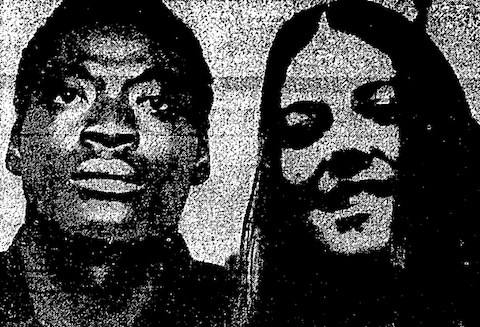 Now that one year has elapsed since The Skies Belong to Us became available for mass consumption, a paperback edition of the book is hitting store shelves from the Strait of Juan de Fuca to the Gulf of Maine. To celebrate this blessed occasion, I’ve decided to offer some limited-edition goodies to the faithful: signed copies of my skyjacker trading cards, of which there are only a few complete sets left.
Now that one year has elapsed since The Skies Belong to Us became available for mass consumption, a paperback edition of the book is hitting store shelves from the Strait of Juan de Fuca to the Gulf of Maine. To celebrate this blessed occasion, I’ve decided to offer some limited-edition goodies to the faithful: signed copies of my skyjacker trading cards, of which there are only a few complete sets left.
Want one? No need to jump through hoops—just drop me a friendly note (brendan at microkhan dot com) with your mailing address and I’ll make it happen. Supplies are limited, so you’re strongly advised to hop to. And once you receive your card, it wouldn’t be the worst thing in the world if you publicly shared a photo of your bounty—The Skies still needs evangelists for the cause.
March 11, 2014
RIP Matthew Power
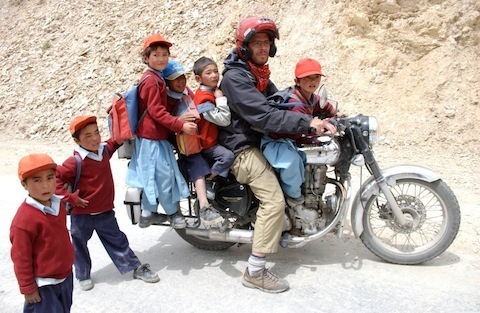 Last November, my friend Matthew Power and I did a reading together at a crowded, cave-like East Village bar. I opened the proceedings with a couple of passages from my skyjacking book, accompanied by some vintage slides of early 1970s nuttiness—my typical presentation, which the crowd seemed to enjoy alright. Then Matt came up, obviously a bit uncomfortable to be the center of attention, and read a long section from his GQ masterpiece about a psychologically scarred drone pilot. Midway through his performance, it was clear that he had absolutely blown me off the stage—the audience, myself included, was astounded by the emotional depth of the reporting and the beauty of the prose. Over pints afterward, I half-teased Matt about the fact that he had made me look like a chump by comparison. In his typically humble fashion, he refused to accept the jealousy-tinged compliment; he preferred to talk about his upcoming trip to South Sudan, where he would be reporting on the work of Médecins Sans Frontieres.
Last November, my friend Matthew Power and I did a reading together at a crowded, cave-like East Village bar. I opened the proceedings with a couple of passages from my skyjacking book, accompanied by some vintage slides of early 1970s nuttiness—my typical presentation, which the crowd seemed to enjoy alright. Then Matt came up, obviously a bit uncomfortable to be the center of attention, and read a long section from his GQ masterpiece about a psychologically scarred drone pilot. Midway through his performance, it was clear that he had absolutely blown me off the stage—the audience, myself included, was astounded by the emotional depth of the reporting and the beauty of the prose. Over pints afterward, I half-teased Matt about the fact that he had made me look like a chump by comparison. In his typically humble fashion, he refused to accept the jealousy-tinged compliment; he preferred to talk about his upcoming trip to South Sudan, where he would be reporting on the work of Médecins Sans Frontieres.
That night has been much in my thoughts today after learning that Matt died while on assignment in Uganda. He was a giant of contemporary nonfiction, a writer whom I admired and envied to no end for his ingenuity, his artistry, and his all-out commitment to the craft. If you were stuck in a hairy situation abroad—say, held up at a border crossing in Papua New Guinea, or detained by a vigilante patrol in the Philippines—there was no one you’d rather have by your side. But Matt was so amazingly low-key—I imagine he’d be quite embarrassed to hear himself described as anything other than a diligent journalist with a passion for roaming the world.
Matt was also one of the most big-hearted, in-love-with-life blokes I’ve ever had the good fortune to call a friend. The few smiles I’ve had today have come from recalling the Bushmills-fueled conversation we once had about the minutiae of dolphin sex, or the time he turned me into an acrophobe by showing me unpublished photos from his epic urban explorers take. Whenever a meet-up with Matt was in the cards, a good time was guaranteed.
Matt and I had plans to eat Korean food in my Queens ‘hood upon his return from Uganda. Knowing that will never happen makes my heart hurt so much.
February 14, 2014
The Wisdom of Deer
 When the Indonesian government looks back upon its handling of Mount Kelud’s latest eruption, it may lament its failure to heed a clue from the animal kingdom. Two days before the volcano began to belch its noxious contents, the critters that inhabited its slopes seemed to know that something was up:
When the Indonesian government looks back upon its handling of Mount Kelud’s latest eruption, it may lament its failure to heed a clue from the animal kingdom. Two days before the volcano began to belch its noxious contents, the critters that inhabited its slopes seemed to know that something was up:
“We received reports from people who claimed to see deer and other animals running out of the forest toward their house,” Sakirman, a former Pandansari village chief, said, adding that the occurrence was significant since the volcano is already on a level-three alert.
Hafi Lufi, head of the Malang Disaster Mitigation Agency (BPBD), said that such an exodus was usually caused by gases rising up from the mountain.
“Smoke may have already been released, so animals have run away from the mountain,” he said. “We’ve prepared masks and evacuation points.”
The BPDB did not, however, order a full evacuation at that point in time—a decision that may well have cost lives in the long run:
Despite the level-three warning, the provincial BPBD has yet to evacuate the 32,000 residents possibly in danger.
“We don’t want to make them panic,” Hafi said. “The status has been raised, but the observation results haven’t shown that an evacuation is urgent.”
I’m sympathetic to this hesitancy to follow the animals’ lead, as our furry compatriots are too often credited with better instincts than they really have. (I’m thinking here of the myth that dogs and horses can predict earthquakes.) But there’s a solid logic to the purported ability of animals to detect volcanic eruptions—their noses are likely more reliable sensors for gas emissions than artificial monitors, especially when those monitors are lightly managed. Perhaps the fleeing deer need to be taken more seriously from here on out.
Follow all the latest Mount Kelud developments here. And pity the volcano’s poor webcam, which gave up the ghost quite early in the process; can’t someone out there develop a protective casing?
November 27, 2013
Small Victories
While recently pondering the precise definition of the word “deadpan,” I felt compelled to look up a quote that stuck with me as a kid. It comes from Boris Loginov, the coach of the Soviet Union’s motoball team, on the eve of the 1986 Goodwill Games. He was evidently asked to defend his sport, which can seem a bit risky to the uninitiated:
It is one of the least dangerous of motorcycle sports. The most terrible injury is legs being broken. Or sometimes broken collarbones. And the goalkeeper sometimes breaks his hands because the ball is heavy and moves quickly. But we finish the season with the same number of players.
There are benefits to defining success downward.
November 25, 2013
Trial by Laughter
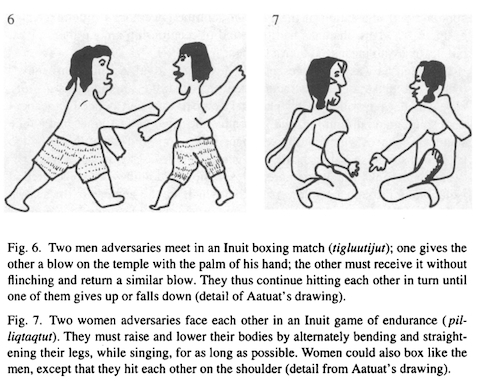 From one of the best-titled anthropological papers of the past several decades, a brief account of one way in which Inuit shamanic gatherings could try the resolve of the easily amused:
From one of the best-titled anthropological papers of the past several decades, a brief account of one way in which Inuit shamanic gatherings could try the resolve of the easily amused:
On the north shore of Hudson Strait, at Akuliaq, when the masked dancers, there called Ekko, appear “the people are not allowed to laugh … if someone laughs, he will soon die.” In Ujaraq’s account of a Tivajuut festival at Pingiqqalik, near Iglulik, the masked dancers first chased people who laughed and hit them with the whip and the snow knife. Then if they caught two men laughing side by side, they obliged them to exchange wives for the night. According to Aava and Aatuat, the newly formed couples, in other words a man and the partner he had chosen, had to enter the ceremonial igloo, as we have already seen, without faltering or giving even the slightest smile, and then go twice very slowly round the pillar holding up the lamp, keeping their eyes fixed on the lamp. They had to remain as straightfaced as possible, in spite of the most lascivious and grotesque demonstrations of the masked dancers, and the most hilarious tricks on the part of the whole gathering, from whom the cry of “Unununununun …” went up in unison.
A beastly difficult test of mental fortitude, but still preferable to the trial by fire.
November 18, 2013
More Skies Live Spots
 Greetings from Los Angeles, where I’m spending a few days working and searching for the perfect shrimp burrito. I need to rush back home via red-eye on Wednesday night, though, in order to pull off a couple of The Skies Belong to Us events. I thought I’d take a moment to share the details of those long-anticipated occasions, in case you want to join in the mirth.
Greetings from Los Angeles, where I’m spending a few days working and searching for the perfect shrimp burrito. I need to rush back home via red-eye on Wednesday night, though, in order to pull off a couple of The Skies Belong to Us events. I thought I’d take a moment to share the details of those long-anticipated occasions, in case you want to join in the mirth.
The first event will be this Thursday, November 21st, at the New York Public Library’s Mid-Manhattan branch (455 Fifth Avenue). It won’t be a traditional reading, but rather a multimedia spectacular featuring 45 rare and awesome images from the golden age of skyjacking. Things kick off at 6:30 sharp.
Then on Friday the 22nd, I’ll be doing a joint event at Brooklyn’s venerable BookCourt with Gregory D. Johnsen, in which we’ll discuss the perils and pleasures of writing about terrorism. The conversation starts at 7 p.m., and I plan on going out drinking in the neighborhood afterwards. If you show up and utter the word “Microkhan” in my ear, I’ll buy you a pint.
November 5, 2013
The Skies Needs Your Vote
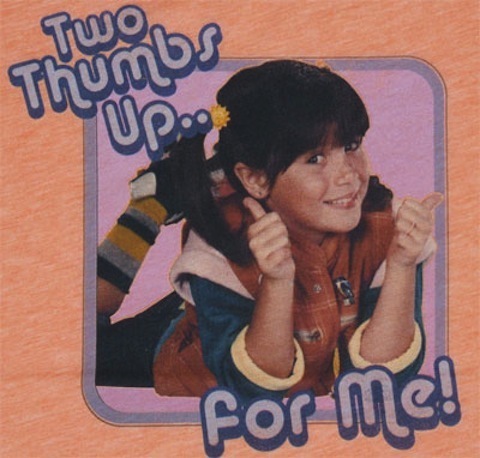 Only the most misguided soul would get into the writing game because he or she craves adulation. Plaudits and ego massages are hard to come by in the line of work, and I’m perfectly fine with that. But I’ll confess to feeling a small twinge of excitement upon learning that The Skies Belong to Us is up for a Goodreads Choice Award, thus giving me my first opportunity to win a multi-round competition since my days of varsity baseball. (Yes, this khan was compelled to play baseball, rather than his preferred yak polo—blame the American educational system.)
Only the most misguided soul would get into the writing game because he or she craves adulation. Plaudits and ego massages are hard to come by in the line of work, and I’m perfectly fine with that. But I’ll confess to feeling a small twinge of excitement upon learning that The Skies Belong to Us is up for a Goodreads Choice Award, thus giving me my first opportunity to win a multi-round competition since my days of varsity baseball. (Yes, this khan was compelled to play baseball, rather than his preferred yak polo—blame the American educational system.)
Being a realist at heart, I know that my skyjacking yarn stands little chance of taking home the top prize—it’s up against many books more beloved. But if I can make it to the final round, I’ll count that as a monster triumph. And if that happens, I vow to post some recently unearthed footage of my childhood appearance on Punky Brewster.
A scintillating deal, though? Please do you part by casting a vote for The Skies Belong to Us, and telling your compatriots to do likewise. And see you back here shortly for some fresh posts on Venezuelan oil exploration, Tasmanian crime families, and counterfeit doubloons.
(Image via My Tee Spot)





